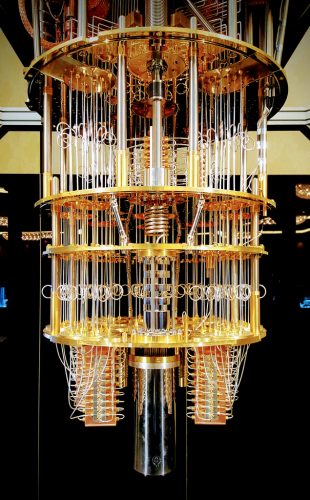Imagine that you flip a coin and measure either heads or tails—easy enough, right? Now, rather than flip, you spin the coin, and you are asked to give a measurement before it lands. You might say you’re not sure, or that it’s spinning. This is a classical analogy of the idea of superposition in quantum mechanics: when we don’t know how or where a particle exists, we use a superposition to describe what or where it could be.
Scientists are developing computers that run on the superposition of quantum bits of information, termed qubits. The ability to be in a superposition of multiple states means that a quantum computer can, in some sense, verify multiple possibilities simultaneously. Unfortunately, like any piece of information travelling through a computer, a qubit can undergo a number of errors due to environmental influences or imprecision.
Researchers in the Schoelkopf Lab at the Yale Quantum Institute have invented a means to reduce the chances of spreading these errors—cutting down ancilla error propagation by a factor of five. But what does this mean?
Quantum circuits use an error detection device called an ancilla qubit, which detects errors in the logical qubits that conduct the actual computations. Interestingly, errors in the ancillas can leak or introduce errors to the logical qubit when it is used, so the researchers designed one that prevents the spread of its own errors.
Serge Rosenblum, a co-author of the study featured in Science magazine, explains how this device works. “By adding an extra degree of freedom in the ancilla, it tolerates relaxation errors,” he said. A relaxation error is when the ancillary qubit accidentally switches between its own set of potential outcomes and ends up with an error, passing it along the circuit.
Theoretically, a functional quantum computer can work exponentially faster than classical computers for certain difficult problems. Despite this, today’s quantum computers are far from achieving this goal. Fault-tolerance, which is the ability of the computer to function despite internal errors, is imperative for this reason.
“Everything needs to be fault tolerant. Otherwise, errors will pile up and then you end up with a classical computer.” Rosenblum says. “There is no universal quantum computer without fault-tolerance.”
Quantum computers can simulate natural phenomena that are impossible to compute in our current-day computers. Taking the steps to create a universal quantum computer would help us learn more about chemistry and material science, among other fields.
Being fault-tolerant will allow these quantum computers to maintain computational stability while providing solutions to many challenging problems. Although it may take a few decades to develop fully fault-tolerant quantum computers, research like Rosenblum’s shows we are heading in the right direction.

